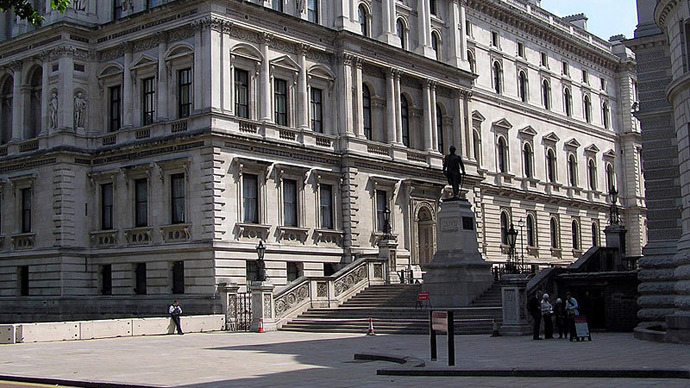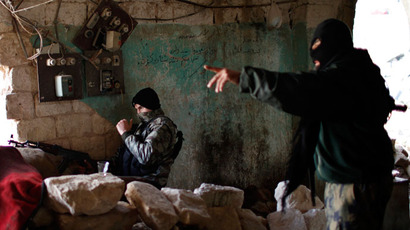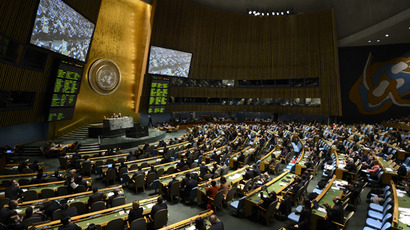UK threatens to ignore Syrian embargo, fortify rebels

Britain will attempt to dismantle the EU arms embargo against Syria so weapons can be supplied to rebel forces, says UK Foreign Secretary William Hague. This comes after a Syrian extremist group fighting Assad forces pledged allegiance to Al-Qaeda.
Hague claimed on Monday chemical weapons have been used in Syria and said Britain wants the ability to ‘take urgent action’ in the event of such future provocations.
The FS also said he will
press the case for an end to the EU arms embargo in talks with
foreign ministers in Istanbul on Saturday.
Emphasizing that no final decision to arm Syria’s rebel movement has been taken, the UK Foreign Secretary reiterated that the government of David Cameron desires “greater flexibility if we decide that urgent action is necessary, for example in response to a specific incident or continued grave deterioration on the ground.”
Although the alleged use of chemical weapons on the ground in Syria has been put forward as a reason to end the embargo, it remains undetermined which side, if any, resorted to the use of such weapons.
“The use of chemical weapons in Syria would demand a serious international response,” Hague warned.
The secretary announced that Britain wants to supply almost $4.6 million worth of equipment to the forces trying to oust President Bashar Assad's government in Syria. The shipment would include 35 vehicles, in particular five armored 4x4s, eight trucks, six SUVs, five pick-ups, a recovery vehicle and four forklifts. The rebels would also receive 20 sets of ballistic armor, 107 generators, 130 solar-powered batteries and civil resilience kits.
Hague was among those advocating more substantial help to Syrian rebels at a G8 summit last week, arguing that this would save civilian lives.
But among the Western adversaries of the Assad government many are concerned that any arms they send to less radical opposition groups may end up in the hands of Al-Qaeda-linked terrorists, who had sidelined the moderate rebels. The leading Nusra Front, which joined the Syrian conflict last year, recently openly confirmed that it is part of the terrorist network’s Iraqi branch.

Arms are being funneled into Syria by several regional countries, including Turkey, Jordan, Saudi Arabia and Kuwait, with the input of the CIA, according to media reports. The Gulf monarchies are also reportedly putting militants willing to fight in Syria on their payroll.
Western countries suggesting delivery of arms to the moderate Free Syrian Army (FSA), believe they would allow the FSA to oppose both the Islamists and country’s regular army. FSA commanders say they need heavy weapons, including anti-tank and anti-aircraft missiles. Such weapons, if they end up in the wrong hands, may greatly empower radical groups in the region, as the example of uncontrolled Libyan stockpiles show.
Russia, which has supplied arms to the Syrian government since the armed conflict erupted in 2011 under previously signed contracts, has been criticized by some Western countries for supporting Assad. Moscow says its critics are using double standards in calling to stop arms shipments to the Syrian government while facilitating or ignoring arms smuggling to the rebels.

Hague discussed the Syrian debacle with his Russian counterpart Sergey Lavrov at a meeting in London last week. Speaking to the media after the talks, the Russian foreign minister said arming the Syrian opposition would be illegal.
“As for the possibility of arming the opposition, as far as I understand, it is not allowed by international law, that's why arming of the opposition directly or indirectly will be the violation of the international law,” Lavrov said.
He added that when a UN arms embargo was issued during the Libyan conflict in 2011, it was violated by European and Arab supporters of the forces trying to oust then-leader Muammar Gaddafi.














